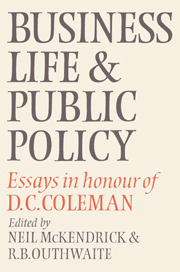Book contents
- Frontmatter
- Contents
- Preface
- List of contributors
- 1 Piscatorial politics in the early Parliaments of Elizabeth I
- 2 Marriage as business: opinions on the rise in aristocratic bridal portions in early modern England
- 3 Age and accumulation in the London business community, 1665–1720
- 4 The use and abuse of credit in eighteenth-century England
- 5 Convicts, commerce and sovereignty: the forces behind the early settlement of Australia
- 6 ‘Gentleman and Players’ revisited: the gentlemanly ideal, the business ideal and the professional ideal in English literary culture
- 7 The City, entrepreneurship and insurance: two pioneers in invisible exports – the Phoenix Fire Office and the Royal of Liverpool, 1800–90
- 8 ‘At the head of all the new professions’: the engineer in Victorian society
- 9 Bernard Shaw, Bertold Brecht and the businessman in literature
- 10 Lost opportunities: British business and businessmen during the First World War
- 11 Ideology or pragmatism? The nationalization of coal, 1916–46
- Bibliography of D. C. Coleman's published works
- Index
3 - Age and accumulation in the London business community, 1665–1720
Published online by Cambridge University Press: 07 October 2009
- Frontmatter
- Contents
- Preface
- List of contributors
- 1 Piscatorial politics in the early Parliaments of Elizabeth I
- 2 Marriage as business: opinions on the rise in aristocratic bridal portions in early modern England
- 3 Age and accumulation in the London business community, 1665–1720
- 4 The use and abuse of credit in eighteenth-century England
- 5 Convicts, commerce and sovereignty: the forces behind the early settlement of Australia
- 6 ‘Gentleman and Players’ revisited: the gentlemanly ideal, the business ideal and the professional ideal in English literary culture
- 7 The City, entrepreneurship and insurance: two pioneers in invisible exports – the Phoenix Fire Office and the Royal of Liverpool, 1800–90
- 8 ‘At the head of all the new professions’: the engineer in Victorian society
- 9 Bernard Shaw, Bertold Brecht and the businessman in literature
- 10 Lost opportunities: British business and businessmen during the First World War
- 11 Ideology or pragmatism? The nationalization of coal, 1916–46
- Bibliography of D. C. Coleman's published works
- Index
Summary
Adam Smith tells us in The Wealth of Nations that the capital of a society‘is the same with that of all the individuals who compose it’ and that any growth in a society's wealth is the sum of the accumulations made by such individuals. Such an emphasis on the accumulation of the individual may read strangely to us who have been brought up in a world of corporations and bureaucracy, but it makes perfectly good sense when seen against the background of the economy of the seventeenth and eighteenth centuries, an economy which was composed overwhelmingly of individual sole traders and small family businesses. It follows that, if we want to understand why the wealth of England expanded in the early modern period, we will need to investigate the conditions which encouraged or discouraged accumulation by individual men and women. The most obvious place to make such an investigation is amongst the London business community. Here, in the largest city in western Europe, was concentrated the great majority of the ‘middle sort of people’, the merchants, tradesmen and shopkeepers whose eager search for profit provided the enterprise which kept much of the rest of the English economy going. Great landowners might be individually richer, but they would be unlikely to match the rate of accumulation of these London businessmen whose whole ethos was directed towards the augmentation of their fortunes.
This London business community has been rather unevenly studied.
- Type
- Chapter
- Information
- Business Life and Public PolicyEssays in Honour of D. C. Coleman, pp. 38 - 63Publisher: Cambridge University PressPrint publication year: 1986
- 1
- Cited by



